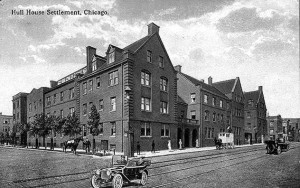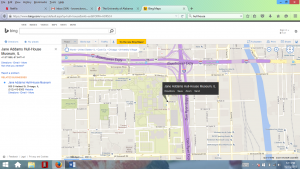
Hull House Settlement, Chicago. 1889. University of Illinois at Chicago, Chicago. Office of the UIC Historian. Web. 15 Oct. 2015.
Jane Addams’ Hull House
800 S. Halstead, Chicago, Illinois
The Hull House settlement was co-founded by the well-known humanitarian Jane Addams and her longtime friend Ellen Gates Starr in 1889. Hull House started as home for disenfranchised citizens within the west side of Chicago and at its height grew to be a 13 building institution. The original mission was to teach immigrants how to speak, read and write English as well as learn principles of democratic citizenship in order to improve the overall living conditions of the residents. Founded on the motto “neighbors helping neighbors”, the Hull House was guided by three basic principles to perpetuate its goals of serving as a beacon of social justice: “1) active and side-by-side participation with community residents in addressing local issues; (2) respect for the dignity of all individuals regardless of ethnic background, socioeconomic status, gender, or age; and (3) a belief that poverty and lack of opportunity breed ignorance, crime, and disease that are the result of financial desperation and not due to a flaw in moral character” (Malekoff 307). From these founding moral values, Hull House flourished into multiple programs that encompassed social and musical arts while adding a summer camp called Bowen Country Club. By 1920, Hull House had become the standard for settlement houses influencing over 200 other settlements nationwide.

Chicago’s Jane Addams Hull House Association, the modern entity that remains from the original Hull House, officially closed its doors on January 27th, 2012. Before the program was terminated, the Hull House Association advocated for causes such as foster care, child care, domestic violence counseling, and job training. Although its doors are officially closed, the legacy of the Hull House lives on in the Jane Addams Hull House Museum in downtown Chicago. Although one cannot truly quantitatively evaluate the impact that Jane Addams’ Hull House had on the plight of the immigrant order, the influences of the Hull House’s initiatives can be seen within many modern social welfare programs today.
Bibliography
Hull House Settlement, Chicago. 1889. University of Illinois at Chicago, Chicago. Office of the UIC Historian. Web. 15 Oct. 2015.
MacDonald, Meg Meneghel. “Urban Experience In Chicago: Hull-House And Its Neighborhoods, 1889-1963/Jane Addams Hull-House Museum.” Journal Of American History 97.1 (2010): 290-291. Academic Search Premier. Web. 15 Oct. 2015.
Malekoff, Andrew, and Catherine P. Papell. “Remembering Hull House, Speaking To Jane Addams, And Preserving Empathy.” Social Work With Groups 35.4 (2012): 306- 312. Academic Search Premier. Web. 15 Oct. 2015.
Laurel Wenckowski